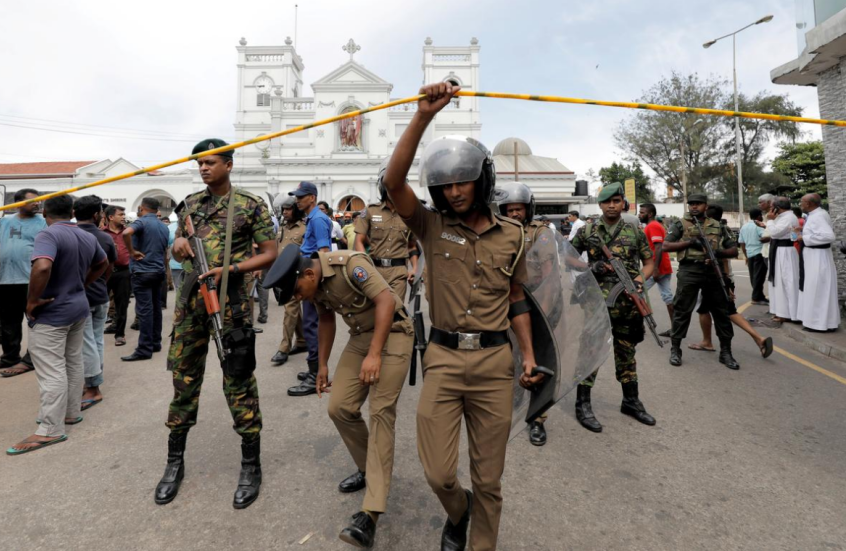
On Easter Sunday, the world woke up to the news of yet another devastating terrorist attack, this time on hotels and churches in Sri Lanka. Over 250 people were killed, including, heartbreakingly, many children.
The target couldn't have been clearer - Christians and Westerners - but the tragedy was soon followed by another as reports emerged of retaliatory acts against Sri Lanka's already persecuted Muslim minority.
For the country as a whole, which was slowly getting back on its feet after a terrible civil war, one of its main industries - tourism - was also crippled by the suicide bombings, leaving many without the livelihoods that had supported them before.
Shalini Wickramasuriya, an elder at the historic St Andrew's Scots Kirk, Colombo, spoke to Christian Today about how the country and the Christian community are coping three months on.
CT: The Easter Sunday attacks must have been terrifying for the Christian community in Sri Lanka. What is the mood like among the country's Christians now? Are there still fears of more attacks?
Shalini: The mood within the churches of Sri Lanka seems to be much better. There is still an element of fear and we see police officers present at the church every Sunday. The larger Catholic churches have more of a presence than ours. There are sporadic visits from the police during the week too.
There have been assurances from the security forces, state intelligence and also the police that the perpetrators and their associates are in police custody, so any immediate threat has been abated for now.
The issue is that Muslims are being falsely accused, randomly arrested and victimised, leaving scope for a revival of sorts, but Christians will not be the target as the victimisation is being carried out by Buddhist extremists.
CT: How did the attacks impact St Andrew's?
Shalini: The initial reaction was fear as the two hotel bombs were in proximity of St Andrew's Scots Kirk. Church attendance was poor but Rev Bill Davnie advocated 'faith not fear' and ensured stringent security measures to ensure the congregation was safe to worship and we went ahead with Sunday worship on 21 April and the ensuing Sundays.
We were shaken by the loss of lives and devastation and perhaps partly for our own solace, reached out to support the Zion Church of Batticaloa.
We also felt that we needed to take an active role in reaching out to the Muslim community to show that we were in solidarity with the majority Muslims who were by no means connected with those who committed the acts of violence. So Rev Bill Davnie and a couple of others went to the local mosque.
CT: The bombings must have impacted security plans for churches. What are some of the things that churches are doing to stay safe?
Shalini: We already have security at our own church which has been briefed by the police.
The other larger churches have a permanent police presence and while attending weddings or extra services or larger gatherings, members of the congregation need to provide their National Identity Card numbers ahead of time.
CT: Do you think the Christian community has changed in any way since the attacks?
Shalini: I think the Christian community is still reeling from the shock. An illustrious lawyer in Batticaloa who is also a Christian remarked at the origins of the bombers and the act of violence - these are our brothers and our neighbours, how could they do this to us? Many Christians and Muslims in Sri Lanka see synergy - shared prophets and ethos of the two faiths.
In many ways I think we have come to appreciate what we are as a faith - forgiving - and that we show love and kindness and do not judge. We have been privileged to have had many profound and spiritual sermons from Rev Davnie that have helped. This message has been universal too from our Christian leaders.
CT: There were reports of acts of retaliation against Muslims in the initial aftermath. How much do religious and ethnic tensions remain a concern? Have faith communities come together in any way?
Shalini: We at St Andrew's Scots Kirk certainly have come to support those Muslim communities in proximity and who we work with through visits to mosques. Our weekly lunch supplier for feeding the poor in the vicinity of the church is a Muslim supplier.
However we see ethnic and religious tensions between the Buddhists and Muslims partly due to the following, which have been reported on in the media.
CT: Visitor numbers are reported to be down across the country. Has this created hardships for the people of Sri Lanka?
Shalini: Yes, these acts of violence have led to tourism being at a worse level than during the years of the conflict. While there was the initial reaction to the bomb blasts which stalled tourism, the European nations, the US and China placed Sri Lanka on travel alerts which meant that travel was almost prohibited. The bans have now been lifted and tourism is slowly recovering but not significantly.
The informal sector appears to struggle more; small time car hire people, tuk tuk drivers, small hotels and businesses. They are hardest hit.
We do hope that desperation does not lead to other acts of violence as people look for scapegoats - we have seen this with the burning of Muslim shops and a boycott of Muslim businesses. Hardship and victimisation only feed extremism and hatred.
CT: Sri Lanka was just starting to get back on its feet again after years of conflict. Do you feel like this has set the country back?
Shalini: Yes, I feel that this incident has set the country back. The numbers of tourists have dropped to such a low, even lower than during the height of the conflict, business confidence is low too and foreign direct investment is on the decline. Now that the travel ban issued by the US, the UK and China has been lifted things could improve for tourism, but for many discerning tourists, they don't wish to visit a country which promotes the victimisation of minorities.
What is alarming is the anti-Muslim hatred propagated by Sinhala Buddhist extremists and this has caused the international community to issue warnings of possible violence and human rights violations.
CT: What is the role of the church at this challenging time for the country and what does the journey towards healing look like in your eyes?
Shalini: The role of the church continues to be measured, building bridges and not judging the mainstream Muslims. We as a church will continue to build on our relationship with the mosque and the business which provides for our lunch programme.
We as a Christian community are healing. In terms of the Zion Church, we know that Muslim businesses are reaching out. The entire medical support for the Zion Church is sponsored by a Muslim business. So many accept that this is the work of an extremist group.













